|
|
|
Sort Order |
|
|
|
Items / Page
|
|
|
|
|
|
|
| Srl | Item |
| 1 |
ID:
067562
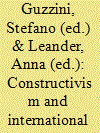

|
|
|
|
|
| Publication |
London, Routledge, 2006.
|
| Description |
xxii, 246p.
|
| Series |
The new international relations
|
| Standard Number |
0415332710
|
|
|
|
|
|
|
|
|
|
|
|
Copies: C:1/I:0,R:0,Q:0
Circulation
| Accession# | Call# | Current Location | Status | Policy | Location |
| 050585 | 327.101/GUZ 050585 | Main | On Shelf | General | |
|
|
|
|
| 2 |
ID:
170284
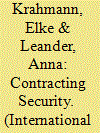

|
|
|
|
|
| Summary/Abstract |
Private military and security companies (PMSCs) are increasingly contracted to provide security in international peacekeeping missions. Yet, we know very little about the practical implications of this development. How do PMSCs reinforce and shape security management within UN peacekeeping operations, and what are the consequences for UN missions and their host populations? To answer these questions, we explore the operational, representative and regulatory security practices in the UN operation in the Democratic Republic of Congo (MONUSCO). Our findings show how seemingly uncontroversial, even benign security practices can have unintended negative consequences. Specifically, we observe that the participation of security firms in MONUSCO's security management contributes to three developments: the differentiation of security between staff and locals, the hardening of MONUSCO's security posture, and the perpetuation of insecurity through the emergence of a local security economy. Contracted security is thus involved in reproducing forms of security that are in some ways diametrically opposed to the aims of the mission to protect civilians and facilitate a sustainable peace.
|
|
|
|
|
|
|
|
|
|
|
|
|
|
|
|
| 3 |
ID:
149112
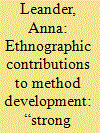

|
|
|
|
|
| Summary/Abstract |
Contrary to common assumptions, there is much to be learned about methods from constructivist/post-structuralist approaches to International Relations (IR) broadly speaking. This article develops this point by unpacking the contributions of one specific method—ethnography—as used in one subfield of IR—Critical Security Studies. Ethnographic research works with what has been termed a “strong” understanding of objectivity. When this understanding is taken seriously, it must lead to a refashioning of the processes of gathering, analyzing, and presenting data in ways that reverse many standard assumptions and instructions pertaining to “sound methods.” Both in the context of observation and in that of justification, working with “strong objectivity” requires a flexibility and willingness to shift research strategies that is at odds with the usual emphasis on stringency, consistency, and carefully planned research. It also requires accepting that the engagement of the researcher with the researched is no regrettable inevitability but a potential to be used and mobilized. If these arguments were more widely acknowledged, it would be easier to justify/recognize the methodological foundations of research in the ethnographic tradition. However, it would also require rethinking standard methods instructions and the judgments they inform.
|
|
|
|
|
|
|
|
|
|
|
|
|
|
|
|
| 4 |
ID:
105939


|
|
|
|
|
| Publication |
2011.
|
| Summary/Abstract |
Global governance links security and finance in four important ways. First, the combined effect of the financial crisis and the global 'war on terror' has been an increasingly explicit merging of finance and security concerns. Second, security and finance were arguably closely linked in the rise of the modern form of government as far back as the late 17th century, a relation still evident in the form of 'government securities' such as bonds and treasuries, which in 2010 rose to new prominence in the various sovereign debt crises of the Eurozone. Third, a considerable literature has shown that finance and security share a claim to universal applicability in (all) other social spheres, resulting in various forms of financialization and securitization ( Martin, 2002; Langley, 2007; Buzan et al., 1998). Finally, not only have the liberal strategies of finance and security converged in a common vocabulary and epistemology of risk (management), but this technology of governing the future is currently undergoing a critical epistemic transformation that in turn implies finance and security in new relationships.
|
|
|
|
|
|
|
|
|
|
|
|
|
|
|
|
| 5 |
ID:
065952


|
|
|
| 6 |
ID:
075659


|
|
|
| 7 |
ID:
101000
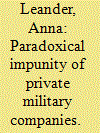

|
|
|
|
|
| Publication |
2010.
|
| Summary/Abstract |
The impunity of private military companies (PMCs) appears increasingly puzzling. Not only is there widespread awareness and public debate about violations of the spirit - if not the letter - of the law; there is also a 'mad scramble' to improve regulation. In spite of this, legal accountability remains problematic. This situation is usually explained either as an expression of the techno-legal difficulties created by the move from government to governance or as reflecting the social, political and economic capital of PMCs. By contrast, this article suggests that the paradox of PMC impunity is best understood by reference to the particular form of authority such organizations enjoy - that is, by reference to their 'symbolic' capital. The article shows that PMC authority is grounded in three interrelated discourses/practices relative to risk/security, market governance and exercise of the state's monopoly on violence. These leave an imprint on the legal accountability sought. The centrality of the risk/security discourse paves the way for exceptionalism; that of the role of market governance for ad-hocism; and that of the discourse of respect for the state's monopoly on violence for inconsequentialism. The result is the coexistence of PMCs' relative impunity with intense contestation and legal innovation.
|
|
|
|
|
|
|
|
|
|
|
|
|
|
|
|
| 8 |
ID:
077390
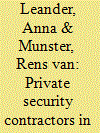

|
|
|
|
|
| Publication |
2007.
|
| Summary/Abstract |
This article explores the loud presence of private security contractors in the evolving and buoyant discussion surrounding Darfur. Relying primarily on statements by security contractors and industry lobby organizations, this article suggests that neo-liberal governmentality has bolstered the expert status of security contractors in the discussions surrounding Darfur. Both in Darfur and more widely, neo-liberal governmentality tends to `depoliticize' security as public debate narrowly focuses on the technicalities and costs of military solutions, while alternative political options, local knowledge and diplomatic alternatives become marginalized. Consequently, public debate may be intense (as is certainly true for Darfur) but lopsidedly centred on security restrictively understood. The depoliticizing trend tied to neo-liberal governmentality is an important change in security governance in Darfur of course, but also in Africa more broadly and beyond. However, since it works through what the editors of this issue refer to as the `complex relations between public and private, state and civil society actors' it tends to eschew analyses assuming that privatization is significant only when and if it undermines public authority and control. The account here testifies to the importance of changes in governance that involve public and private actors alike
|
|
|
|
|
|
|
|
|
|
|
|
|
|
|
|
| 9 |
ID:
108240
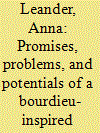

|
|
|
|
|
| Publication |
2011.
|
| Summary/Abstract |
The promise of Bourdieu-inspired analysts to provide a "different reading" of the international is receiving increasing attention in the academic discipline of international relations (IR). This attention also generates awareness and of problems inherent in the Bourdieuian approach and a desire to develop it further (or abandon it). These discussions have often focused on the difficulties that arise for IR as a consequence of the structuralism of Bourdieu's approach, and as such they dovetail with the discussions between Bourdieu's "critical sociology" and the "pragmatic school" in the French context. This article uses these discussions to clarify what it entails to paint a different picture-my picture-of the international using Bourdieu's thinking tools. More specifically, it argues that Bourdieu's thinking can be used as a basis for a non-structuralist staging of the international taking on board the critique raised by pragmatists and integrating many of the insights developed by them. Bourdieu often referred to his own thinking as a "structuralist constructivism," so this article takes Bourdieu's thinking in a direction he may not have liked to go. However, it sticks closely to the spirit of his contention that one should never privilege scholastic theorizing for the sake of theorizing nor hesitate to "read a thinker against himself."
|
|
|
|
|
|
|
|
|
|
|
|
|
|
|
|
| 10 |
ID:
108497
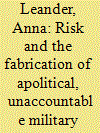

|
|
|
|
|
| Publication |
2011.
|
| Summary/Abstract |
This article argues that risk is central in (re)producing the unaccountable commercial military/security markets that are a normal part of our political reality. The argument is twofold: first it is suggested that risk rationalities and the associated 'preventive imperative' has a depoliticising effect - accentuated by the impersonal spread of risk rationalities and the strategies of risk professionals - which lowers the eagerness to seek accountability. However, and second, depoliticisation is significant above all as a serious obstacle to the innovative thinking that is the sine qua non of effective accountability. The enmeshed, 'hybrid', nature of the market places it in the 'blind spot' of law and is as such fundamental to the current lack of accountability. Consequently, moving beyond established regulatory frameworks and technical understandings of accountability (that is, politicising the market) is a precondition for more effective accountability. Failing to do so, will leave the current rapid legal innovation impotent while reinforcing impunity as the focus on and confidence in established regulatory frameworks grows. The failure to politicise creates an 'accountability paradox' where the pursuit of accountability diminishes it. The article develops this argument with reference to Blackwater's (now Xe) role in the so called CIA 'Killing Program'.
|
|
|
|
|
|
|
|
|
|
|
|
|
|
|
|
| 11 |
ID:
188992
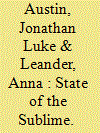

|
|
|
|
|
| Summary/Abstract |
Security politics is everywhere, its tendrils entangled with every aspect of life. Nonetheless, this hyper-securitised status quo has not interrupted the flow of everyday life, nor the circulation of people, goods, or ideas. For the privileged of the world, a paradox has emerged: war, terrorism, ecological disaster, pandemics, and many other ‘monstrous’ forms of insecurity are now experienced as mundane and manageable phenomena in spite of the exceptional political measures, and more generalised affective states of fear and anxiety, that they have proliferated. How has this occurred? This article argues that aesthetic processes and politics are fundamental to the maintenance of this paradox. To do so, we draw on Bruno Latour’s concept of ‘transfrayeurs’ (trans-fears) to understand how modes of aesthetic design are deployed to simultaneously locate sublime imaginaries of insecurity in our midst while also allowing us to live with, accept, and forget their presence. More specifically, we suggest that trans-fearing is achieved through ‘aesthetic protocols’ that specify principles for designing material, affective, and discursive forms into our lives in ways that allow for the careful ‘calibration’ of how we (unequally) experience a hierarchised, depoliticised, and militarised ‘state of the sublime’ within global security politics.
|
|
|
|
|
|
|
|
|
|
|
|
|
|
|
|
| 12 |
ID:
169163
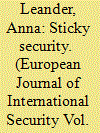

|
|
|
|
|
| Summary/Abstract |
In security studies and beyond, technological developments are associated with technocratic, rationalistic, transparent forms of security governed from a distance. In much of the advertising of tracking devices the associations made are very different not to say opposed to this. The advertising composes security anchored in sensemaking and resonance rather than calculus and reason, working from within and below rather than from a above at distance and depending on the negotiation of opaque co-presences rather than the establishment of precision and transparency. The consequence is that advertising not only extends but also deepens the grip of military/security matters: making them sticky. Moreover, the heterogeneity of the elements is such that what is composed is a shifting collage rather than a stable composition. This argument makes a threefold contribution to security studies: a theoretical reconceptualisation of what it means to compose security, an empirical intervention in the debates surrounding the politics of tracking devices and a methodological intervention in favour of collaborationist research strategies.
|
|
|
|
|
|
|
|
|
|
|
|
|
|
|
|
|
|
|
|
|